Environmental Citizen Science Initiatives as a Springboard towards the Education for Environmental Citizenship: A Systematic Literature Review of Empirical Research
Abstract
:1. Introduction
2. Theoretical Framework
“Environmental Citizenship is defined as the responsible pro-environmental behavior of citizens who act and participate in society as agents of change in the private and public sphere on a local, national and global scale, through individual and collective actions in the direction of solving contemporary environmental problems, preventing the creation of new environmental problems, achieving sustainability and developing a healthy relationship with nature. ‘Environmental Citizenship’ includes the practise of environmental rights and duties, as well as the identification of the underlying structural causes of environmental degradation and environmental problems and the development of the willingness and the competences for critical and active engagement and civic participation to address those structural causes and to act individually and collectively within democratic means, taking into account inter- and intra-generational justice.”
2.1. The EC Competences
2.2. The EC Actions
2.3. The EEC Outcomes
3. Rationale
4. Research Questions (RQs)
- RQ1: Whether participation in environmental CS initiatives contributes to the development of citizens’ EC competences, actions, and EEC outcomes;
- RQ2: What are the main correlations among the EC competences, actions, and EEC outcomes in the reviewed environmental CS initiatives?
- RQ3: Which are the more salient components from the EC competences, actions, and EEC outcomes in the reviewed environmental CS initiatives?
5. Methodology
5.1. Data Collection
5.2. Data Analysis
5.2.1. Coding Scheme
5.2.2. Content Analysis
Inter-Reliability Process
5.2.3. Descriptive Analysis
5.2.4. Bivariate Correlations
5.2.5. K-Means Cluster Analysis
6. Results
6.1. RQ1: Whether Participation in Environmental CS Initiatives Contributes to the Development of Citizens’ EC Competences, Actions and Outcomes
6.1.1. Overview of EC Competences
EC Competences: Knowledge
EC Competences: Skills
EC Competences: Attitudes
EC Competences: Values
EC Competences: Behaviors
6.1.2. EC Actions
6.1.3. EEC Outcomes
6.2. RQ2: What Are the Main Correlations, among the EC Competences, Actions, and EEC Outcomes in the Reviewed Environmental CS Initiatives?
6.2.1. Correlations between the EC Competences
Correlations between EC Knowledge and Skills
Correlations between EC Knowledge and Attitudes
Correlations between EC Skills and Attitudes
Correlations between EC Skills and Values
Correlations between EC Values and Attitudes
Interrelations between EC Values and Behaviors
Correlations between EC Attitudes and Behaviors
Correlations between EC Skills and Behaviors
6.2.2. Correlations between the EC Competences and Actions
Correlations between EC Knowledge and Actions
Correlations between EC Skills and Actions
Correlations between EC Attitudes and Actions
Correlations between EC Values and Actions
Correlations between EC Behaviors and Actions
6.2.3. Correlations between the EC Competences and EEC Outcomes
Correlations between EC Knowledge and EEC Outcomes
Correlations between EC Skills and Outcomes
Correlations between EC Attitudes and EEC Outcomes
Correlations between EC Behaviors and EEC Outcomes
6.2.4. Interrelations between EC Actions and EEC Outcomes
6.3. RQ3: Which Are the More Salient Components from the EC Competences, Actions, and EEC Outcomes?
7. Discussion
7.1. Contribution to Citizens’ EC Competences, EC Actions and EEC Outcomes
7.2. Correlations among the EC Competences, EC Actions, and EEC Outcomes in Environmental CS Initiatives
7.3. The Most Salient Components from the EC Competences, EC Actions, and EEC Outcomes
8. Conclusions
9. Limitations
10. Future Directions
Supplementary Materials
Author Contributions
Funding
Institutional Review Board Statement
Informed Consent Statement
Data Availability Statement
Acknowledgments
Conflicts of Interest
References
- Millennium Ecosystem Assessment. Ecosystems and Human Well-Being: Biodiversity Synthesis; World Resources Institute: Washington, DC, USA, 2005. [Google Scholar]
- Irwin, A. Citizen Science A Study of People, Expertise and Sustainable Development, 1st ed.; Psychology Press: Hove, UK, 1995. [Google Scholar] [CrossRef]
- Pettibone, L.; Vohland, K.; Ziegler, D. Understanding the (inter)disciplinary and institutional diversity of citizen science: A survey of current practice in Germany and Austria. PLoS ONE 2017, 12, 1–16. [Google Scholar] [CrossRef] [Green Version]
- Tulloch, A.I.T.; Possingham, H.P.; Joseph, L.N.; Szabo, J.; Martin, T.G. Realising the full potential of citizen science monitoring programs. Biol. Conserv. 2013, 165, 128–138. [Google Scholar] [CrossRef] [Green Version]
- Shirk, J.L.; Bonney, R. Citizen Science Framework Review: Informing a Framework for Citizen Science within the US Fish and Wildlife Service; Cornell Lab of Ornithology: Ithaca, NY, USA, 2015. [Google Scholar]
- Hecker, S.; Haklay, M.; Bowser, A.; Makuch, Z.; Johannes, V.; Boon, A. Citizen Science: Innovation in Open Science, Society and Policy; UCL Press: London, UK, 2018; Available online: http://www.jstor.org/stable/j.ctv550cf2 (accessed on 30 October 2021).
- McKinley, D.C.; Miller-Rushing, A.J.; Ballard, H.L.; Bonney, R.; Brown, H.; Cook-Patton, S.C.; Evans, D.M.; French, R.A.; Parrish, J.K.; Phillips, T.B.; et al. Citizen science can improve conservation science, natural resource management, and environmental protection. Biol. Conserv. 2017, 208, 15–28. [Google Scholar] [CrossRef] [Green Version]
- Pocock, M.J.O.; Roy, H.E.; August, T.; Kuria, A.; Barasa, F.; Bett, J.; Githiru, M.; Kairo, J.; Kimani, J.; Kinuthia, W.; et al. Developing the global potential of citizen science: Assessing opportunities that benefit people, society and the environment in East Africa. J. Appl. Ecol. 2019, 56, 274–281. [Google Scholar] [CrossRef]
- Bonney, R.; Cooper, C.B.; Dickinson, J.; Kelling, S.; Phillips, T.; Rosenberg, K.V.; Shirk, J. Citizen science: A developing tool for expanding science knowledge and scientific literacy. BioScience 2009, 59, 977–984. [Google Scholar] [CrossRef]
- Johnson, M.F.; Hannah, C.; Acton, L.; Popovici, R.; Karanth, K.K.; Weinthal, E. Network environmentalism: Citizen scientists as agents for environmental advocacy. Glob. Environ. Chang. 2014, 29, 235–245. [Google Scholar] [CrossRef]
- Chandler, M.; See, L.; Copas, K.; Bonde, A.M.Z.; López, B.C.; Danielsen, F.; Legind, J.K.; Masinde, S.; Miller-Rushing, A.J.; Newman, G.; et al. Contribution of citizen science towards international biodiversity monitoring. Biol. Conserv. 2017, 213, 280–294. [Google Scholar] [CrossRef] [Green Version]
- Kelly, R.; Fleming, A.; Pecl, G.T.; Von Gönner, J.; Bonn, A. Citizen science and marine conservation: A global review: Citizen science and marine conservation. Philos. Trans. R. Soc. B Biol. Sci. 2020, 375, 20190461. [Google Scholar] [CrossRef] [PubMed]
- Pandya, R.; Dibner, K.A. Learning through citizen science: Enhancing opportunities by design. In Learning Through Citizen Science: Enhancing Opportunities by Design; The National Academies Press: Washington, DC, USA, 2019. [Google Scholar] [CrossRef]
- Shirk, J.L.; Ballard, H.L.; Wilderman, C.C.; Phillips, T.; Wiggins, A.; Jordan, R.; McCallie, E.; Minarchek, M.; Lewenstein, B.V.; Krasny, M.E.; et al. Public participation in scientific research: A framework for deliberate design. Ecol. Soc. 2012, 17, 29. [Google Scholar] [CrossRef] [Green Version]
- Turrini, T.; Dörler, D.; Richter, A.; Heigl, F.; Bonn, A. The threefold potential of environmental citizen science—Generating knowledge, creating learning opportunities and enabling civic participation. Biol. Conserv. 2018, 225, 176–186. [Google Scholar] [CrossRef]
- Vasiliades, M.A.; Hadjichambis, A.C.; Paraskeva-Hadjichambi, D.; Adamou, A.; Georgiou, Y. A Systematic Literature Review on the Participation Aspects of Environmental and Nature-Based Citizen Science Initiatives. Sustainability 2021, 13, 7457. [Google Scholar] [CrossRef]
- Hadjichambis, A.C.; Paraskeva-Hadjichambi, D. Education for Environmental Citizenship: The Pedagogical Approach. In Conceptualizing Environmental Citizenship for 21st Century Education; Environmental Discourses in Science Education; Hadjichambis, A.C., Reis, P., Paraskeva-Hadjichambi, D., Činčera, J., Boeve-de Pauw, J., Gericke, N., Knippels, M.-C., Eds.; Springer: Cham, Switzerland, 2020; Volume 4, pp. 237–261. [Google Scholar] [CrossRef] [Green Version]
- Jørgensen, F.A.; Jørgensen, D. Citizen science for environmental citizenship. Conserv. Biol. 2020, 35, 1–4. [Google Scholar] [CrossRef]
- Tsybulsky, D. Self-Reported Reasons for Participating in Pro-environmental Citizen Science Activities: A Case Study of Butterfly Monitoring in Israel. Front. Educ. 2020, 5, 116. [Google Scholar] [CrossRef]
- Georgiou, Y.; Hadjichambis, A.C.; Hadjichambi, D. Teachers’ perceptions on environmental citizenship: A systematic review of the literature. Sustainability 2021, 13, 2622. [Google Scholar] [CrossRef]
- Monte, T.; Reis, P. Design of a pedagogical model of education for environmental citizenship in primary education. Sustainability 2021, 13, 6000. [Google Scholar] [CrossRef]
- Jordan, R.C.; Gray, S.A.; Howe, D.V.; Brooks, W.R.; Ehrenfeld, J.G. Knowledge Gain and Behavioral Change in Citizen-Science Programs. Conserv. Biol. 2011, 25, 1148–1154. [Google Scholar] [CrossRef]
- Chao, S.H.; Jiang, J.Z.; Wei, K.C.; Ng, E.; Hsu, C.H.; Te, Y.C.; Fang, W.T.W. Understanding pro-environmental behavior of citizen science: An exploratory study of the bird survey in Taoyuan’s farm ponds project. Sustainability 2021, 13, 5126. [Google Scholar] [CrossRef]
- Pierini, V.I.; Mazzeo, N.; Cazenave, M.; Semmartin, M. Waste generation and pro-environmental behaviors at household level: A citizen science study in Buenos Aires (Argentina). Resour. Conserv. Recycl. 2021, 170, 105560. [Google Scholar] [CrossRef]
- Santori, C.; Keith, R.J.; Whittington, C.M.; Thompson, M.B.; Van Dyke, J.U.; Spencer, R.J. Changes in participant behavior and attitudes are associated with knowledge and skills gained by using a turtle conservation citizen science app. People Nat. 2021, 3, 66–76. [Google Scholar] [CrossRef]
- Frick, J.; Kaiser, F.G.; Wilson, M. Environmental knowledge and conservation behavior: Exploring prevalence and structure in a representative sample. Personal. Individ. Differ. 2004, 37, 1597–1613. [Google Scholar] [CrossRef]
- Johnson, L.; Morris, P. Towards a framework for critical citizenship education. Curric. J. 2010, 21, 77–96. [Google Scholar] [CrossRef] [Green Version]
- The Council of the European Union. Council recommendation of 22 May 2018 on key competences for lifelong learning (text with EEA relevance). Off. J. Eur. Union 2018, 1, 1–13. Available online: https://eur-lex.europa.eu/legal-content/EN/TXT/PDF/?uri=CELEX:32018H0604(01)&from=EN (accessed on 10 September 2021).
- Bouman, T.; Steg, L.; Kiers, H. Measuring Values in Environmental Research: A Test of an Environmental Portrait Value Questionnaire. Front. Psychol. 2018, 9, 564. [Google Scholar] [CrossRef]
- Stern, P.C. Toward a coherent theory of environmentally significant behavior. J. Soc. Issues 2000, 56, 407–424. [Google Scholar] [CrossRef]
- Evans, J.D. Straightforward Statistics for the Behavioral Sciences; Thomson Brooks/Cole Publishing: Pacific Grove, CA, USA, 1996. [Google Scholar]
- Han, J.; Kamber, M.; Pei, J. Data Mining: Concepts and Techniques; Elsevier: Amsterdam, The Netherlands, 2011. [Google Scholar]
- Bela, G.; Peltola, T.; Young, J.C.; Balázs, B.; Arpin, I.; Pataki, G.; Bonn, A. Learning and the transformative potential of citizen science. Conserv. Biol. 2016, 30, 990–999. [Google Scholar] [CrossRef] [Green Version]
- Haywood, B.K. Beyond Data Points and Research Contributions: The Personal Meaning and Value Associated with Public Participation in Scientific Research. Int. J. Sci. Educ. Part B Commun. Public Engagem. 2016, 6, 239–262. [Google Scholar] [CrossRef]
- McGreavy, B.; Calhoun, A.J.K.; Jansujwicz, J.; Levesque, V. Citizen science and natural resource governance: Program design for vernal pool policy innovation. Ecol. Soc. 2016, 21, 48. [Google Scholar] [CrossRef] [Green Version]
- Crall, A.W.; Newman, G.J.; Stohlgren, T.J.; Holfelder, K.A.; Graham, J.; Waller, D.M. Assessing citizen science data quality: An invasive species case study. Conserv. Lett. 2011, 4, 433–442. [Google Scholar] [CrossRef]
- Brossard, D.; Lewenstein, B.; Bonney, R. Scientific knowledge and attitude change: The impact of a citizen science project. Int. J. Sci. Educ. 2005, 27, 1099–1121. [Google Scholar] [CrossRef]
- Peter, M.; Diekötter, T.; Kremer, K. Participant outcomes of biodiversity citizen science projects: A systematic literature review. Sustainability 2019, 11, 2780. [Google Scholar] [CrossRef] [Green Version]
- Phillips, T.; Porticella, N.; Constas, M.; Bonney, R. A Framework for Articulating and Measuring Individual Learning Outcomes from Participation in Citizen Science. Citiz. Sci. Theory Pract. 2018, 3, 3. [Google Scholar] [CrossRef] [Green Version]
- Kenyon, E.; Christoff, A.; Wisdom, S. Citizen science: Expanding ideas of citizenship and science. Soc. Stud. Res. Pract. 2020, 15, 83–96. [Google Scholar] [CrossRef]
- Dobson, A. Environmental citizenship: Towards sustainable development. Sustain. Dev. 2007, 15, 276–285. [Google Scholar] [CrossRef]
- Valencia Sáiz, Á. Globalisation, cosmopolitanism and ecological citizenship. Environ. Politics 2005, 14, 163–178. [Google Scholar] [CrossRef]
- Ganzevoort, W.; van den Born, R. The thrill of discovery: Significant nature experiences among biodiversity citizen scientists. Ecopsychology 2019, 11, 22–32. [Google Scholar] [CrossRef] [Green Version]
- Evans, C.; Abrams, E.; Reitsma, R.; Roux, K.; Salmonsen, L.; Marra, P.P. The Neighborhood Nestwatch program: Participant outcomes of a citizen-science ecological research project. Conserv. Biol. 2005, 19, 589–594. [Google Scholar] [CrossRef]
- Hayward, B. Children, Citizenship and Environment: Nurturing a Democratic Imagination in a Changing World; Routledge: Abingdon-on-Thames, UK, 2012. [Google Scholar]
- Latif, S.A.; Omar, M.S.; Bidin, Y.H.; Awang, Z. Role of environmental knowledge in creating pro-environmental residents. Procedia Soc. Behav. Sci. 2013, 105, 866–874. [Google Scholar] [CrossRef] [Green Version]
- Liobikienė, G.; Poškus, M.S. The importance of environmental knowledge for private and public sphere pro-environmental behavior: Modifying the Value-Belief-Norm theory. Sustainability 2019, 11, 3324. [Google Scholar] [CrossRef] [Green Version]
- Smederevac-Lalic, M.; Finger, D.; Kovách, I.; Lenhardt, M.; Petrovic, J.; Djikanovic, V.; Boeve-de Pauw, J. Knowledge and Environmental Citizenship. In Conceptualizing Environmental Citizenship for 21st Century Education; Environmental Discourses in Science Education; Hadjichambis, A.C., Reis, P., Paraskeva-Hadjichambi, D., Činčera, J., Boeve-de Pauw, J., Gericke, N., Knippels, M.-C., Eds.; Springer: Cham, Switzerland, 2020; Volume 4, pp. 69–82. [Google Scholar] [CrossRef] [Green Version]
- Reis, P. Environmental citizenship and youth activism. In Conceptualizing Environmental Citizenship for 21st Century Education; Environmental Discourses in Science Education; Hadjichambis, A.C., Reis, P., Paraskeva-Hadjichambi, D., Činčera, J., Boeve-de Pauw, J., Gericke, N., Knippels, M.-C., Eds.; Springer: Cham, Switzerland, 2020; Volume 4, pp. 139–148. [Google Scholar] [CrossRef] [Green Version]
- Schusler, T.M.; Krasny, M.E.; Peters, S.J.; Decker, D.J. Developing citizens and communities through youth environmental action. Environ. Educ. Res. 2009, 15, 111–127. [Google Scholar] [CrossRef]
- Berkowitz, A.R.; Ford, M.E.; Brewer, C.A. A framework for integrating ecological literacy, civics literacy, and environmental citizenship in environmental education. In Environmental Education and Advocacy: Changing Perspectives of Ecology & Education; Cambridge University Press: Cambridge, UK, 2005. [Google Scholar]
- Freire, P. Pedagogia do Oprimido (Pedagogy of the Oppressed); Paz e Terra: Rio de Janeiro, Brazil, 1987. [Google Scholar]
- Hadjichambis, A.; Reis, P. Introduction to the conceptualisation of environmental citizenship for twenty-first-century education. In Conceptualizing Environmental Citizenship for 21st Century Education; Environmental Discourses in Science Education; Hadjichambis, A.C., Reis, P., Paraskeva-Hadjichambi, D., Činčera, J., Boeve-de Pauw, J., Gericke, N., Knippels, M.-C., Eds.; Springer: Cham, Switzerland, 2020; Volume 4, pp. 1–14. [Google Scholar] [CrossRef] [Green Version]
- Smith, G.A. Place-based education: Breaking through the constraining regularities of public school. Environ. Educ. Res. 2007, 13, 189–207. [Google Scholar] [CrossRef]
- Levinson, R.; Paraskeva-Hadjichambi, D.; Bedsted, B.; Manov, B.; Hadjichambis, A. Political Dimensions of Environmental Citizenship. In Conceptualizing Environmental Citizenship for 21st Century Education; Environmental Discourses in Science Education; Hadjichambis, A.C., Reis, P., Paraskeva-Hadjichambi, D., Činčera, J., Boeve-de Pauw, J., Gericke, N., Knippels, M.-C., Eds.; Springer: Cham, Switzerland, 2020; Volume 4, pp. 17–28. [Google Scholar] [CrossRef] [Green Version]
- Capra, F. The Web of Life: A New Scientific Understanding of Living Systems; Anchor: New York, NY, USA, 1997. [Google Scholar]
- Kyburz-Graber, R. 3 Socioecological Approaches to Environmental Education and Research: A Paradigmatic Response to Behavioral Change Orientations. In International Handbook of Research on Environmental Education; Routledge: Abingdon-on-Thames, UK, 2013; pp. 23–32. [Google Scholar]
- Jackson, R.; Barbagallo, F.; Haste, H. Strengths of public dialogue on science-related issues. Crit. Rev. Int. Soc. Political Philos. 2005, 8, 349–358. [Google Scholar] [CrossRef]
- Goldman, D.; Hansmann, R.; Činčera, J.; Radović, V.; Telešienė, A.; Balžekienė, A.; Vávra, J. Education for environmental citizenship and responsible environmental Behavior. In Conceptualizing Environmental Citizenship for 21st Century Education; Environmental Discourses in Science Education; Hadjichambis, A.C., Reis, P., Paraskeva-Hadjichambi, D., Činčera, J., Boeve-de Pauw, J., Gericke, N., Knippels, M.-C., Eds.; Springer: Cham, Switzerland, 2020; Volume 4, pp. 115–137. [Google Scholar] [CrossRef] [Green Version]
- Effeney, G.; Davis, J. Education for sustainability: A case study of pre-service primary teachers’ knowledge and efficacy. Aust. J. Teach. Educ. 2013, 38, 32–46. [Google Scholar] [CrossRef] [Green Version]
- Desjean-Perrotta, B.; Moseley, C.; Cantu, L.E. Preservice teachers’ perceptions of the environment: Does ethnicity or dominant residential experience matter? J. Environ. Educ. 2008, 39, 21–32. [Google Scholar] [CrossRef]
- Parra, G.; Hansmann, R.; Hadjichambis, A.C.; Goldman, D.; Paraskeva-Hadjichambi, D.; Sund, P.; Sund, L.; Gericke, N.; Conti, D. Education for Environmental Citizenship and Education for Sustainability. In Conceptualizing Environmental Citizenship for 21st Century Education; Environmental Discourses in Science Education; Hadjichambis, A.C., Reis, P., Paraskeva-Hadjichambi, D., Činčera, J., Boeve-de Pauw, J., Gericke, N., Knippels, M.-C., Eds.; Springer: Cham, Switzerland, 2020; Volume 4, pp. 149–160. [Google Scholar] [CrossRef] [Green Version]
- Bonney, R.; Ballard, H.; Jordan, R.; McCallie, E.; Phillips, T.; Shirk, J.; Wilderman, C.C. Public Participation in Scientific Research: Defining the Field and Assessing Its Potential for Informal Science Education A CAISE Inquiry Group Report; Center for Advancement of Informal Science Education (CAISE): Washington, DC, USA, 2009. [Google Scholar]
- Schaefer, T.; Kieslinger, B.; Brandt, M.; van den Bogaert, V. Evaluation in Citizen Science: The Art of Tracing a Moving Target. In The Science of Citizen Science; Springer: Cham, Switzerland, 2021; pp. 495–514. [Google Scholar]
- Mingers, J.; Leydesdorff, L. A review of theory and practice in scientometrics. Eur. J. Oper. Res. 2015, 246, 1–19. [Google Scholar] [CrossRef] [Green Version]
- Mongeon, P.; Paul-Hus, A. The journal coverage of Web of Science and Scopus: A comparative analysis. Scientometrics 2016, 106, 213–228. [Google Scholar] [CrossRef]
- Stuhmcke, S.M. Children as Change Agents for Sustainability: An Action Research Case Study in a Kindergarten. Ph.D. Dissertation, Queensland University of Technology, Brisbane, Australia, 2012. [Google Scholar]
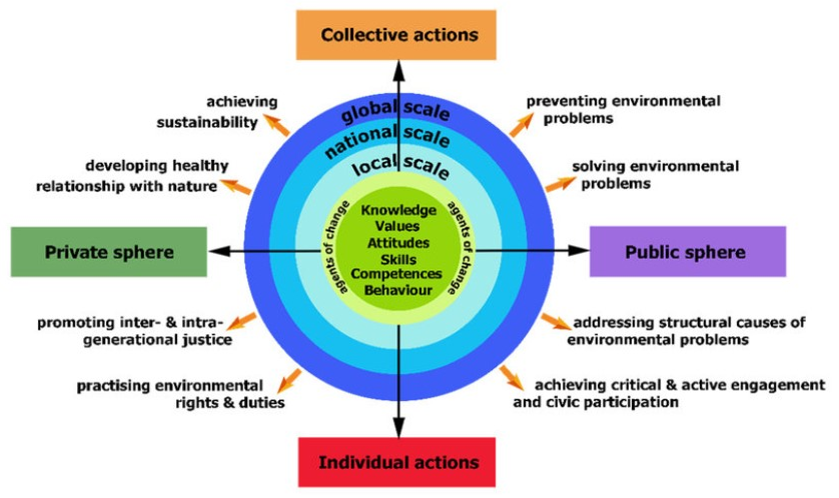
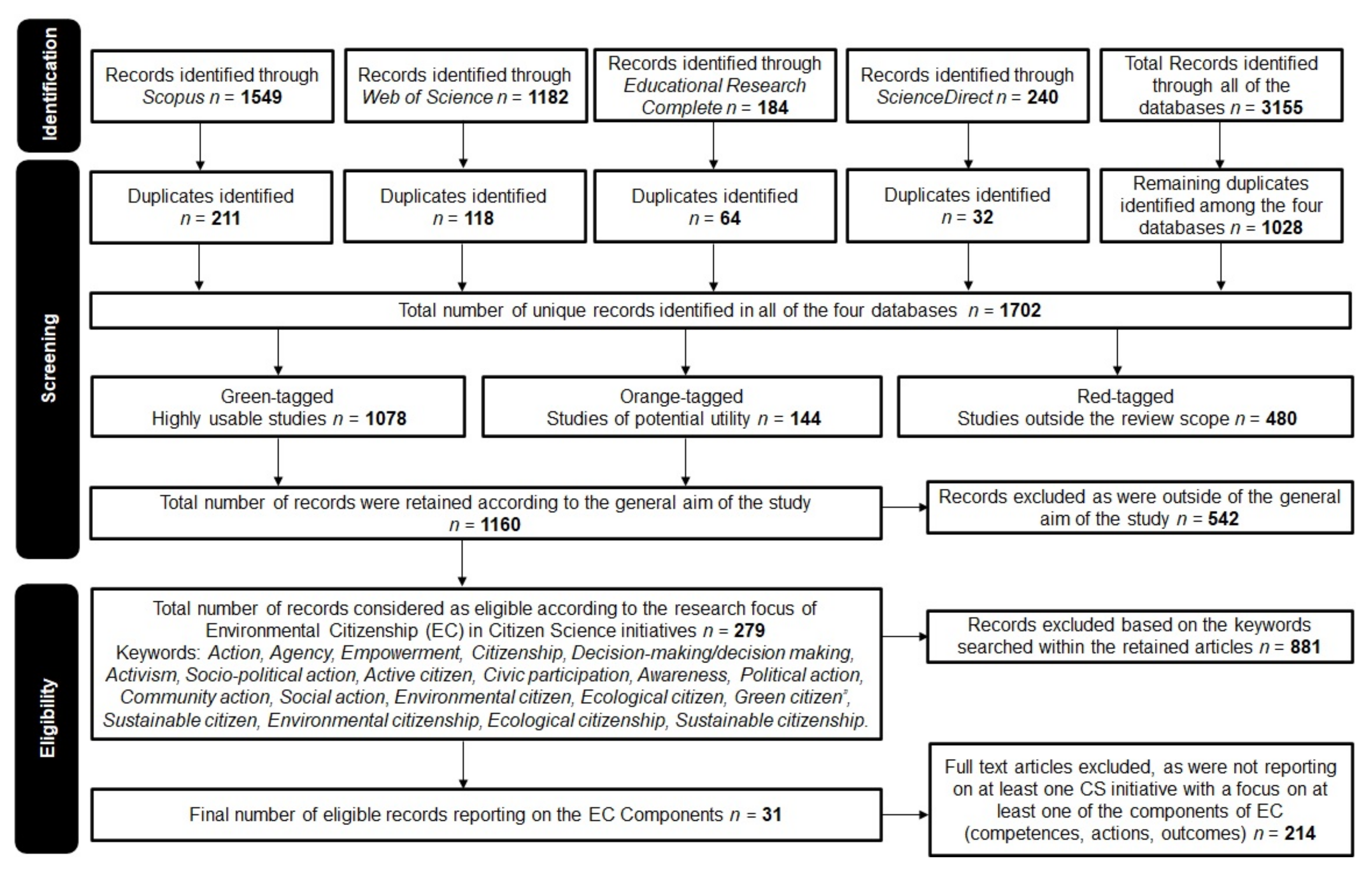
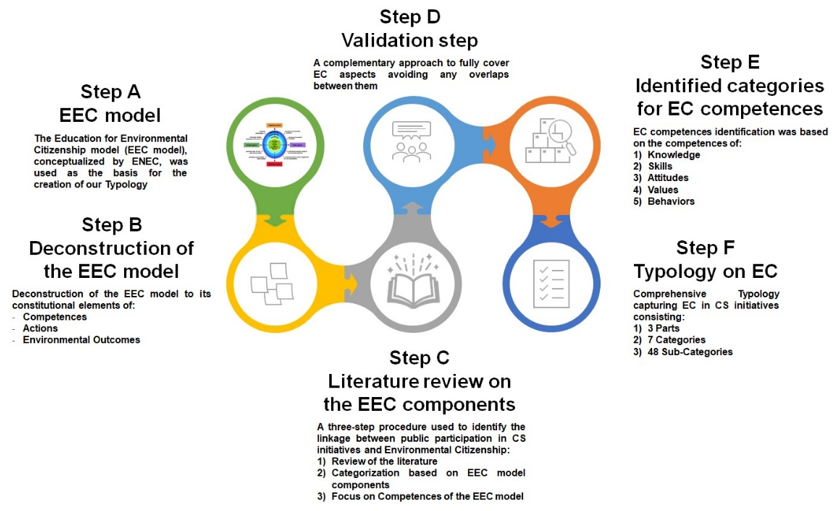

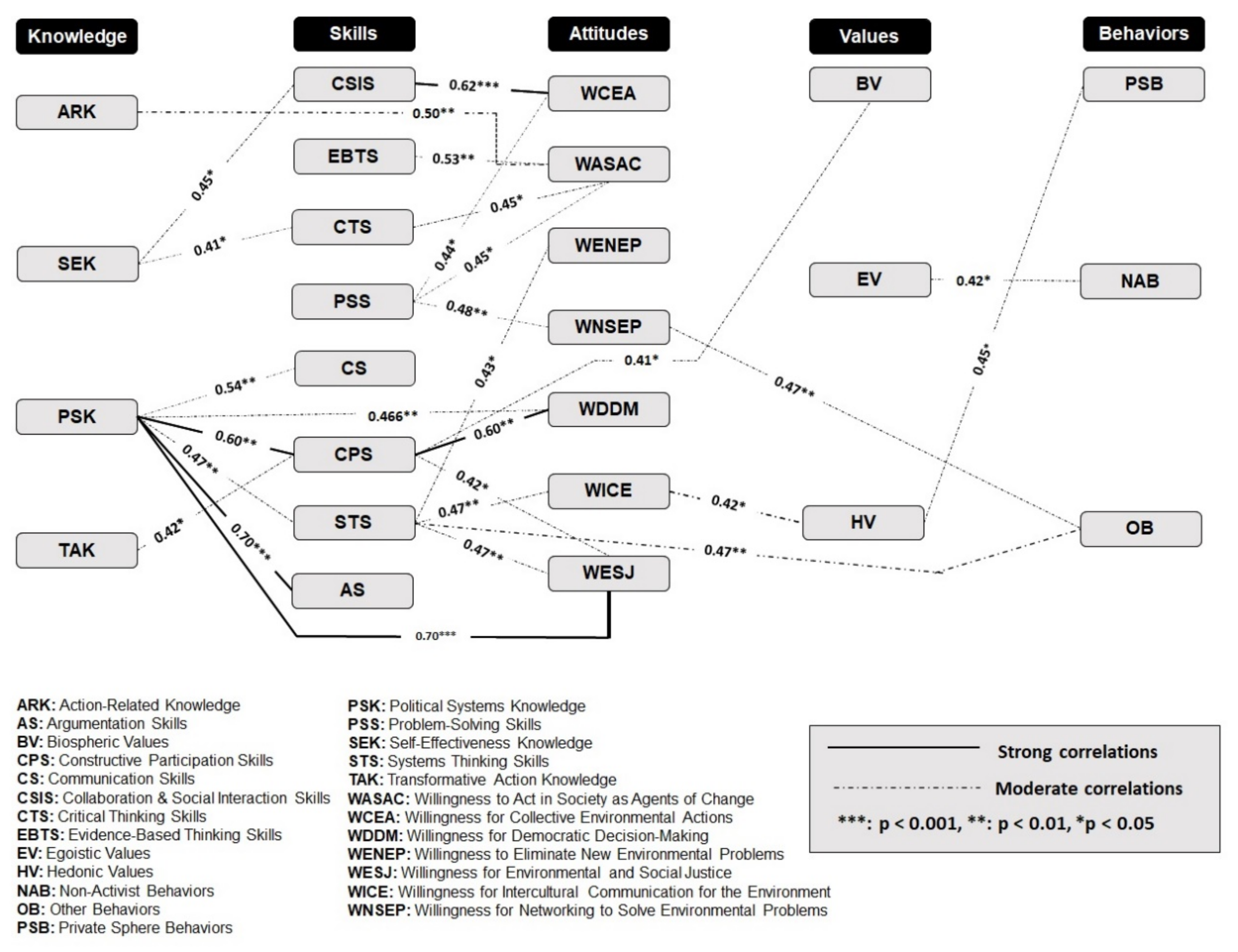
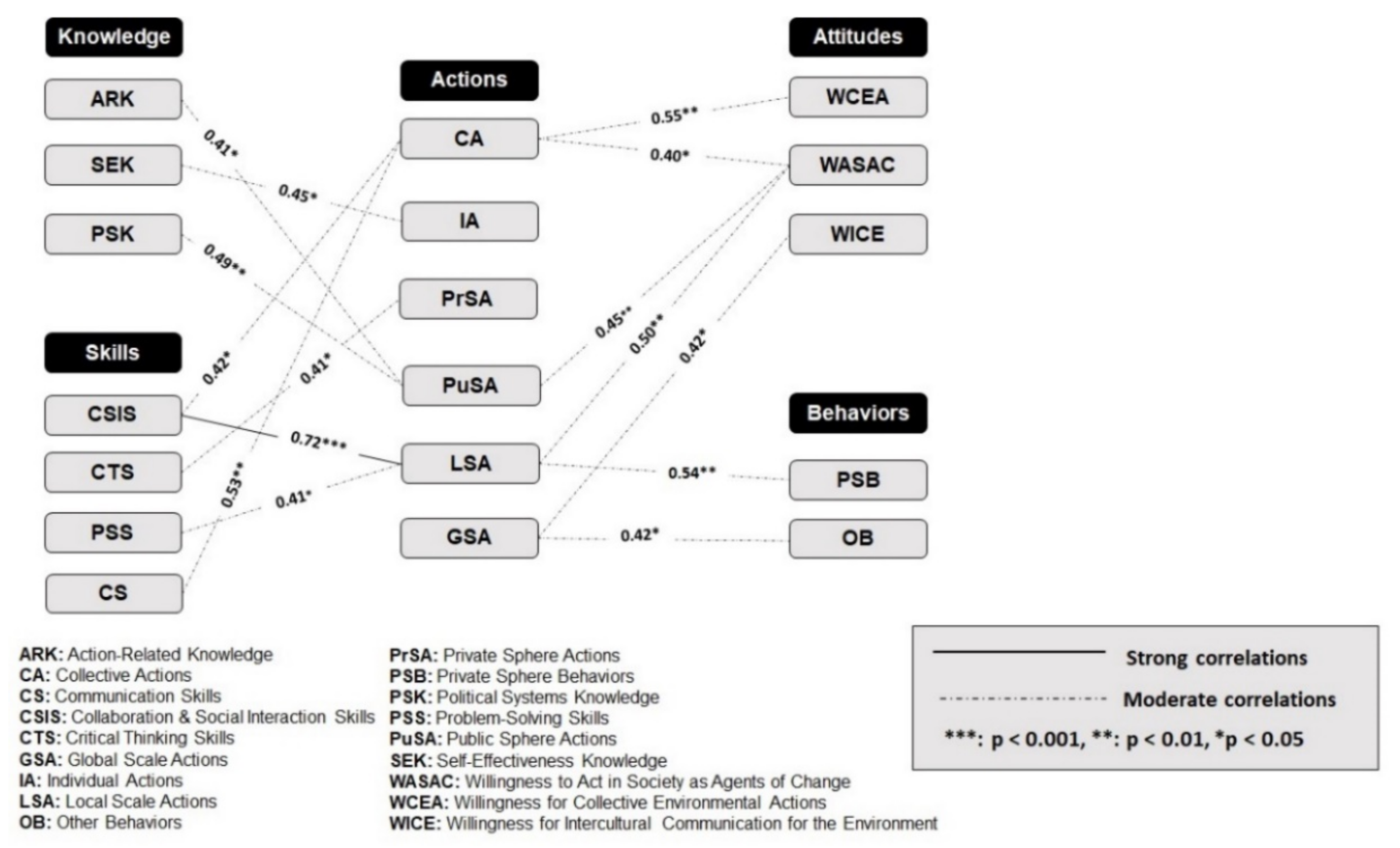
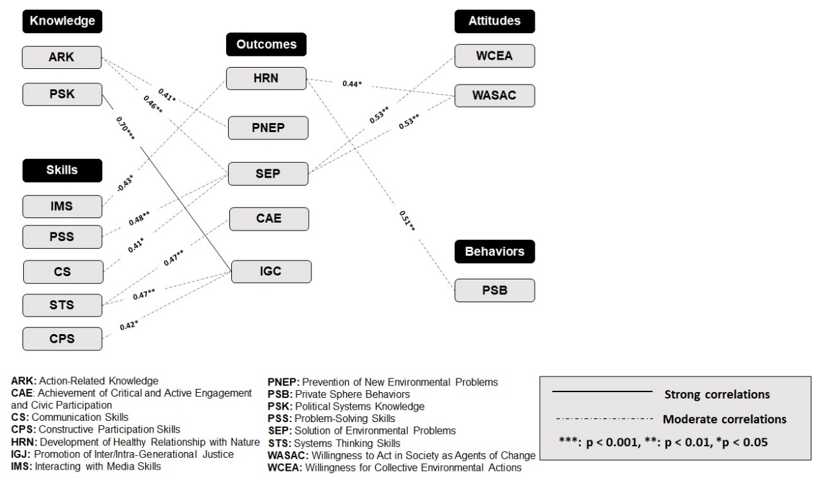
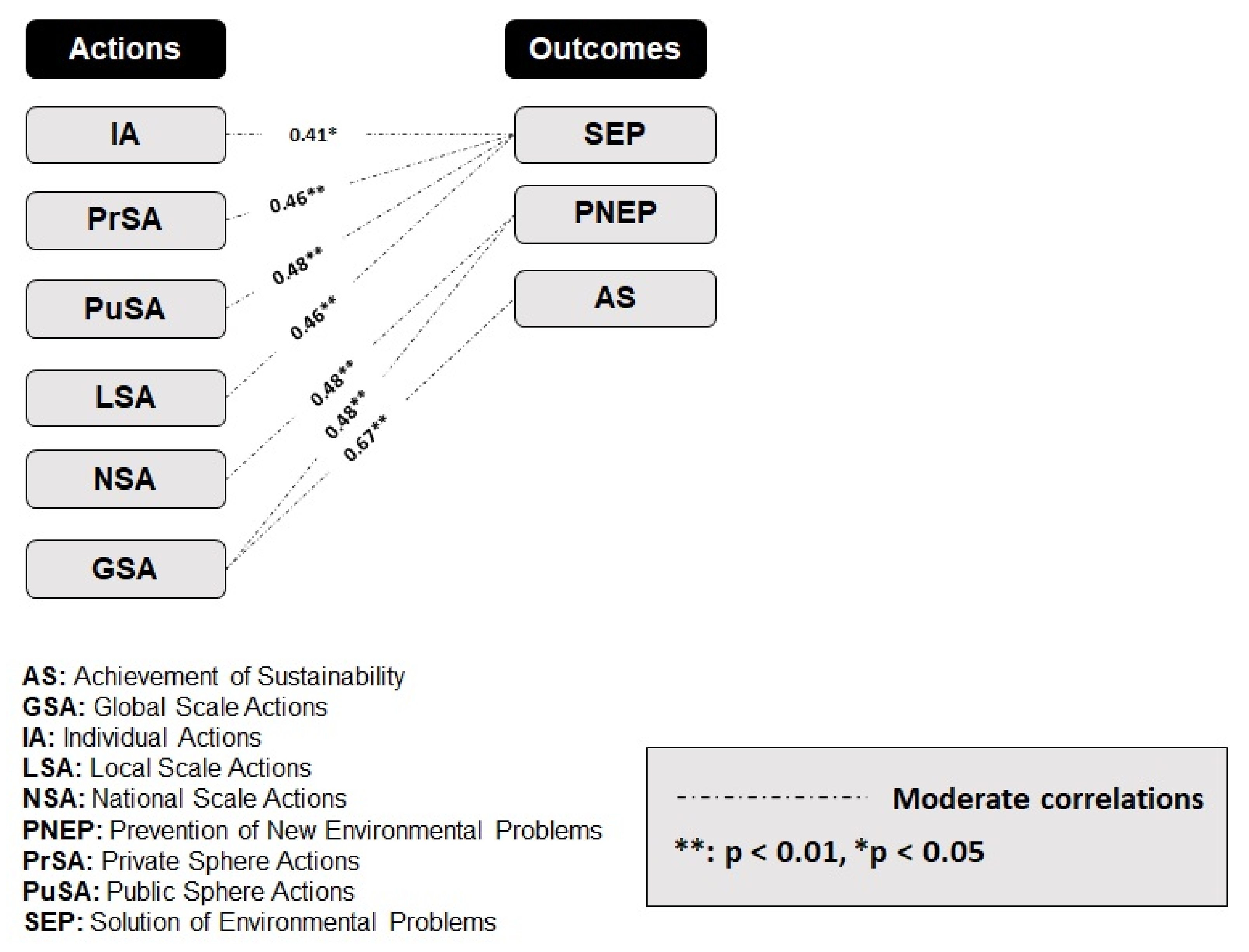

| EC Components | Sources |
|---|---|
| EC Competences: Knowledge (EC-C-K) | |
| Environmental Systems Knowledge (ESK) | [26] |
| Action-Related Knowledge (ARK) | [26] |
| Self-Effectiveness Knowledge (SEK) | [26] |
| Political Systems Knowledge (PSK) | [27] |
| Transformative Action Knowledge (TAK) | [27] |
| EC Competences: Skills (EC-C-S) | |
| Collaboration and Social Interaction Skills (CSIS) | [17,28] |
| Critical Τhinking Skills (CTS) | [17,28] |
| Problem-Solving Skills (PSS) | [17,28] |
| Communication Skills (CS) | [17,28] |
| Systems Thinking Skills (STS) | [17] |
| Evidence-Based Thinking Skills (EBTS) | [17] |
| Decision-Making Skills (DMS) | [17] |
| Argumentation Skill (AS) | [28] |
| Constructive Participation Skills (CPS) | [28] |
| Interacting with Media Skills (IMS) | [28] |
| Critical Understanding of Media Skills (CUMS) | [28] |
| EC Competences: Attitudes (EC-C-A) | |
| Willingness to Act in Society as Agents of Change (WASAC) | [17] |
| Willingness to Eliminate New Environmental Problems (WENEP) | [17] |
| Willingness for Collective Environmental Actions (WCEA) | [17] |
| Willingness for Networking to Solve Environmental Problems (WNSEP) | [17] |
| Respect for Environmental Rights (RER) | [28] |
| Willingness for Democratic Decision-Making (WDDM) | [28] |
| Willingness for Intercultural Communication for the Environment (WICE) | [28] |
| Willingness to Take Responsibility for the Environment (WTRE) | [28] |
| Willingness for Environmental and Social Justice (WESJ) | [28] |
| EC Competences: Values (EC-C-V) | |
| Biospheric Values (BV) | [29] |
| Altruistic Values (AV) | [29] |
| Egoistic Values (EV) | [29] |
| Hedonic Values (HV) | [29] |
| EC Competences: Behaviors (EC-C-B) | |
| Activism Behaviors (AB) | [30] |
| Non-Activist Behaviors (NAB) | [30] |
| Private Sphere Behaviors (PSB) | [30] |
| Other Behaviors (OB) | [30] |
| EC Actions (EC-A) | |
| Collective Actions (CA) | [17] |
| Individual Actions (IA) | [17] |
| Private Sphere Actions (PrSA) | [17] |
| Public Sphere Actions (PuSA) | [17] |
| Local Scale Actions (LSA) | [17] |
| National Scale Actions (NSA) | [17] |
| Global Scale Actions (GSA) | [17] |
| EEC Outcomes (EEC-O) | |
| Development of Healthy Relationship with Nature (HRN) | [17] |
| Prevention of New Environmental Problems (PNEP) | [17] |
| Solution of Environmental Problems (SEP) | [17] |
| Achievement of Sustainability (AS) | [17] |
| Achievement of Critical and Active Engagement and Civic Participation (CAE) | [17] |
| Promotion of Inter/Intra-Generational Justice (IGJ) | [17] |
| Practice of Environmental Rights and Duties (ERD) | [17] |
| Addressing Structural Causes of Environmental Problems (SCEP) | [17] |
| EC Competences | N | % |
|---|---|---|
| Knowledge (EC-C-K) | n = 25 | 80.5% |
| Environmental Systems Knowledge (ESK) | n = 19 | 61.3% |
| Action-Related Knowledge (ARK) | n = 11 | 35.5% |
| Self-Effectiveness Knowledge (SEK) | n = 11 | 35.5% |
| Political Systems Knowledge (PSK) | n = 2 | 6.5% |
| Transformative Action Knowledge (TAK) | n = 1 | 3.2% |
| Skills (EC-C-S) | n = 27 | 87.1% |
| Collaboration and Social Interaction Skills (CSIS) | n = 16 | 51.6% |
| Evidence-Based Thinking Skills (EBTS) | n = 16 | 51.6% |
| Interacting with Media Skills (IMS) | n = 13 | 41.9% |
| Critical Understanding of Media Skills (CUMS) | n = 7 | 22.6% |
| Critical Thinking Skills (CTS) | n = 7 | 22.6% |
| Problem-Solving Skills (PSS) | n = 7 | 22.6% |
| Communication Skills (CS) | n = 6 | 19.4% |
| Constructive Participation Skills (CPS) | n = 5 | 16.1% |
| Systems Thinking Skills (STS) | n = 4 | 12.9% |
| Decision-Making Skills (DMS) | n = 1 | 3.2% |
| Argumentation Skill (AS) | n = 1 | 3.2% |
| Attitudes (EC-C-A) | n = 19 | 61.3% |
| Willingness for Collective Environmental Actions (WCEA) | n = 14 | 45.2% |
| Willingness to Act in Society as Agents of Change (WASAC) | n = 10 | 32.3% |
| Willingness to Eliminate New Environmental Problems (WENEP) | n = 8 | 25.8% |
| Willingness for Networking to Solve Environmental Problems (WNSEP) | n = 4 | 12.9% |
| Willingness for Democratic Decision-Making (WDDM) | n = 2 | 6.5% |
| Willingness for Intercultural Communication for the Environment (WICE) | n = 1 | 3.2% |
| Willingness for Environmental and Social Justice (WESJ) | n = 1 | 3.2% |
| Willingness to Take Responsibility for the Environment (WTRE) | n = 0 | 0% |
| Respect for Environmental Rights (RER) | n = 0 | 0% |
| Values (EC-C-V) | n = 11 | 35.5% |
| Biospheric Values (BV) | n = 16 | 51.6% |
| Egoistic Values (EV) | n = 5 | 16.1% |
| Hedonic Values (HV) | n = 5 | 16.1% |
| Altruistic Values (AV) | n = 3 | 9.7% |
| Behaviors (EC-C-B) | n = 8 | 25.8% |
| Private Sphere Behaviors (PSB) | n = 6 | 19.4% |
| Activism Behaviors (AB) | n = 2 | 6.5% |
| Non-Activist Behaviors (NAB) | n = 1 | 3.2% |
| Other Behaviors (OB) | n = 1 | 3.2% |
| EEC Outcomes | N | % |
|---|---|---|
| Development of Healthy Relationship with Nature (HRN) | n = 15 | 48.4% |
| Prevention of New Environmental Problems (PNEP) | n = 14 | 45.2% |
| Solution of Environmental Problems (SEP) | n = 13 | 41.9% |
| Achievement of Sustainability (AS) | n = 6 | 19.4% |
| Achievement of Critical and Active Engagement and Civic Participation (CAE) | n = 1 | 3.2% |
| Promote Inter/Intra-Generational Justice (IGJ) | n = 1 | 3.2% |
| Practice Environmental Rights and Duties (ERD) | n = 0 | 0% |
| Address Structural Causes of Environmental Problems (SCEP) | n = 0 | 0% |
Publisher’s Note: MDPI stays neutral with regard to jurisdictional claims in published maps and institutional affiliations. |
© 2021 by the authors. Licensee MDPI, Basel, Switzerland. This article is an open access article distributed under the terms and conditions of the Creative Commons Attribution (CC BY) license (https://creativecommons.org/licenses/by/4.0/).
Share and Cite
Adamou, A.; Georgiou, Y.; Paraskeva-Hadjichambi, D.; Hadjichambis, A.C. Environmental Citizen Science Initiatives as a Springboard towards the Education for Environmental Citizenship: A Systematic Literature Review of Empirical Research. Sustainability 2021, 13, 13692. https://doi.org/10.3390/su132413692
Adamou A, Georgiou Y, Paraskeva-Hadjichambi D, Hadjichambis AC. Environmental Citizen Science Initiatives as a Springboard towards the Education for Environmental Citizenship: A Systematic Literature Review of Empirical Research. Sustainability. 2021; 13(24):13692. https://doi.org/10.3390/su132413692
Chicago/Turabian StyleAdamou, Anastasia, Yiannis Georgiou, Demetra Paraskeva-Hadjichambi, and Andreas Ch. Hadjichambis. 2021. "Environmental Citizen Science Initiatives as a Springboard towards the Education for Environmental Citizenship: A Systematic Literature Review of Empirical Research" Sustainability 13, no. 24: 13692. https://doi.org/10.3390/su132413692
APA StyleAdamou, A., Georgiou, Y., Paraskeva-Hadjichambi, D., & Hadjichambis, A. C. (2021). Environmental Citizen Science Initiatives as a Springboard towards the Education for Environmental Citizenship: A Systematic Literature Review of Empirical Research. Sustainability, 13(24), 13692. https://doi.org/10.3390/su132413692







